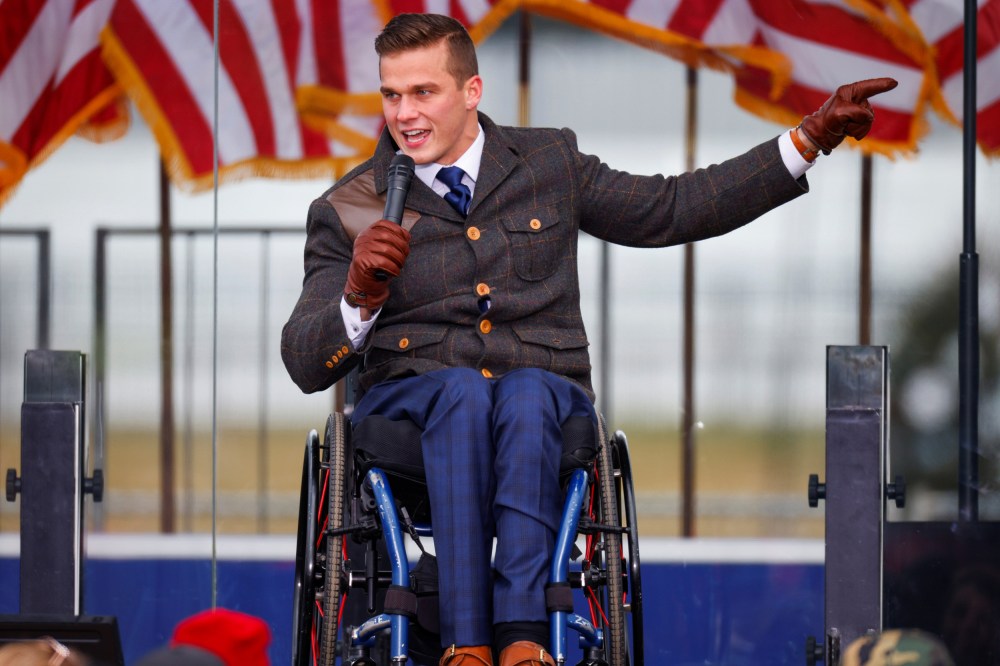Rep. Madison Cawthorn, R-N.C., may be the youngest member of Congress, but he’s already racking up a number of scandals that could rival those of his veteran peers.
It’s that he felt compelled to summon these false heroic narratives about his disability that should cause nondisabled folks to reflect on the ecosystem we’ve created.
According to a report by Sara Luterman at The Nation, in addition to maybe having helped to incite the armed riots at the U.S. Capitol and having visited Hitler’s vacation home, it appears he flat-out lied about having a thriving real estate business before he ran for Congress and about having been accepted to the U.S. Naval Academy before the accident that partly paralyzed him. In addition, he was reported to have fabricated stories about having trained for the Paralympics.
We could sit here all day and analyze Cawthorn’s deceitful actions toward the public he took an oath to serve. But it’s that he felt compelled to summon these false heroic narratives about his disability that should cause nondisabled folks to reflect on the ecosystem we’ve created, an ecosystem that allows Cawthorn’s gigantic lies to thrive.

Let this be an opportunity for nondisabled people to realize that the disability inspiration fable was created only to make them feel comfortable about their own ableism. Because while his political scandals include a lot of embarrassing details, they reveal far more about nondisabled people and culture than they do about him.
“None of this would be possible if the public weren’t complicit in perpetuating ableism,” disability rights activist and writer Imani Barbarin told me. Cawthorn, she said, “is doing nothing but benefiting from the decadeslong tradition of using people’s inherent ableism to separate who he is from his actions using disability.”
“None of this would be possible if the public weren’t complicit in perpetuating ableism.”
She said “nondisabled people are easy to manipulate” because disability tends to be flattened when it’s represented. “Because the media consistently presents disabled people as one-dimensional creatures whose only existence is to inspire, he can ride the coattails of those representations to present an air of innocence without much pushback.”
From the conversations I’ve had with disability rights activists, it seems the grift Cawthorn was running wasn’t fooling many members of the disabled community. Luterman reports that among Paralympic athletes, Cawthorn was more of a punchline than an inspiration.
What’s saddest to me is that it’s clear @CawthornforNC made such wild claims and got away with it for so long because the media is so unfamiliar with the disabled community that even the most ridiculous claims were simply accepted. We didn’t even ask.
— Jessica Huseman (@JessicaHuseman) January 22, 2021
During the 2020 Republican National Convention, disability Twitter, which assembles under the hashtag #CripTheVote, reacted with shock when Cawthorn made himself stand during the national anthem (he uses a wheelchair) because it was perceived as being uniquely performative for a nondisabled audience.
It’s ableist to expect people who are disabled to stand for an anthem, which is why the announcement to “stand if you are able” at the inauguration of President Joe Biden was noted by so many people in the community. Even though the bar remains far too low, it’s still unusual to see basic inclusion of disability in film and TV — and especially in government.

People with disabilities are expected to prioritize the comfort and feelings of people without disabilities so often that most nondisabled people don’t even notice that there are major and harmful flaws in the representation of disability that has been fed to them.












